
PUMPA - SMART LEARNING
எங்கள் ஆசிரியர்களுடன் 1-ஆன்-1 ஆலோசனை நேரத்தைப் பெறுங்கள். டாப்பர் ஆவதற்கு நாங்கள் பயிற்சி அளிப்போம்
Book Free DemoScene 1
The scene opens in the Seeonee Hills. It’s seven o’clock, a sunny evening, in the middle of the jungle. The Moon is yet to rise and with no stars to brighten the sky, utter darkness surrounds the forest.
Narrator: Father Wolf wakes up from his day’s rest, releases and spreads out his paws one after the other to make himself ready for the hunt. Mother Wolf with her big grey nose drops her four tumbling, squealing cubs into the mouth of the cave where they all live.
Father Wolf: Augrh! It is time to hunt again. (Moves down to spring downhill, where he notices a little shadow with a bushy tail at the entrance and whines).
Tabaqui (the Jackal): Good Luck go with you, O chief of the Wolves. And good luck and strong white teeth go with noble children that they may never forget the hungry in this world.
Explanation:
The play takes place in the Seeonee Hills. Seeonee hills are not fictional. They are located in the Seoni city of the Indian state of Madhya Pradesh.
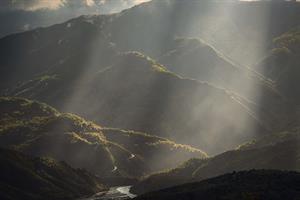
Seeonee Hills where the play is taking place
It was seven o'clock in the evening. Though it had been a sunny evening, the sun had set, and the jungle had become darker. There wasn't a moon or a star to brighten the sky and the forest. It was completely dark.
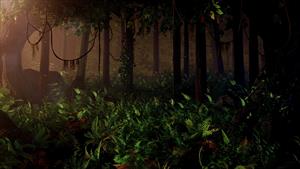
The jungle was getting darker
The play begins with the narrator introducing the characters. Father Wolf and Mother Wolf are at their cave. While the father wolf can be seen stretching from his day's rest, the mother wolf picks and drops their four cubs at the mouth of the cave where they live.
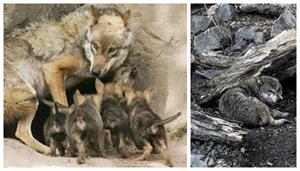
Mother Wolf with cubs; Father Wolf taking rest; Father Wolf waking from his day's rest
An interesting fact about wolves is that they are active during the night. While the humans work during the day, the wolves sleep and take a rest. On the other hand, during the night, when people and several other animals are sleeping, the wolves go for their hunting. Such animals are called nocturnal animals.
Hence, you could see that Father Wolf was getting ready to hunt after sleeping and resting through the day. As he moved down, he saw a shadow of something with a bushy tail moving towards him. It was Tabaqui, the jackal. Father Wolf was not happy at the sight of the jackal and cried in annoyance.
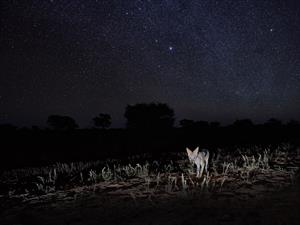
Tabaqui (the Jackal) visits the wolves
Tabaqui came into view and spoke to the wolf. Since Tabaqui was a lazy Jackal, he fed on the food left by wolves or other animals. He was quite unpopular among the wolves because he mocked at animals by pretending to be humble and cordial. Moreover, he was a sidekick of Shere Khan, the villain of the story.
Tabaqui realised that the wolf was about to go for his hunting and began with his mockery. He wished Father Wolf good luck on his hunt and called him the chief of the wolves. The Jackal was probably hoping that a good hunt to the wolves would gain him a decent dinner. Continuing with the mock-cordiality, the Jackal made it plain that he sought food when he wished the wolf-cubs each a set of healthy teeth. As the cubs could grow into great hunters, he wanted them to remember the needy and starving animals like the Jackal.
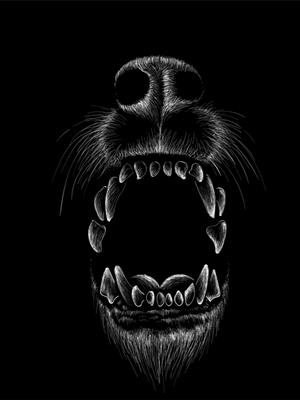
Tabaqui wishes the wolf-cubs each a set of healthy teeth
In the dialogues of Tabaqui, one could see that he had used the phrases "o chief of the wolves" and "noble children" to refer to the Father Wolf and his cubs, respectively. This is an instance of him being mock-cordial. Again, this is not a case of flattery, as both Father Wolf and Tabaqui are aware that the compliments are not sincere.
Meaning of difficult words:
S.No | Words | Meaning |
1 | Seeonee Hills | Originally written as Seoni hills, the hills are located in Madhya Pradesh |
2 | Jungle | A tropical forest in which trees and plants grow very closely together |
3 | Scene | A part of a play or film in which the action stays in one place for a continuous period of time |
4 | Rise | Come or go up |
5 | Utter | Very great or to the largest degree possible |
6 | Paw | The foot of an animal that has claws or nails, such as a cat, dog, or bear |
7 | Tumble | To fall quickly and without control |
8 | Squeal | To make a long, very high sound or cry |
9 | Mouth | The opening of something, like a hole or cave |
10 | Augrh | An expression to show irritation, anger, or disappointment |
11 | Spring | To move quickly and suddenly towards a particular place |
12 | Whine | An unpleasant high sound or voice; also, to make a high, complaining sound |
13 | Chief | Highest in rank |
14 | Noble | Belonging to a high social rank in a society, especially by birth |
Reference:
State Council of Educational Research and Training (2019). Term-3 English Standard-6. The Jungle Book. (pp 116 - 121). Published by the Tamil Nadu Textbook and Educational Services Corporation.